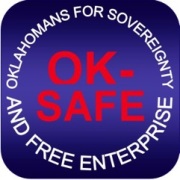(9/8/11 UPDATE: Below is the revised agenda for the first joint committee meeting.)
The first meeting of the joint legislative committee on the effects of the federal health care law (Affordable Care Act, aka “ObamaCare”) on Oklahoma will be held in Oklahoma City on Wednesday, September 14, 2011 at 9:00 am in the House chamber at the OK State Capitol.
This first meeting appears to be featuring some of the key members of the Health Insurance Exchange Steering Committee from the Oklahoma Health Care Authority. The OHCA is the recipient of the federal grants to implement health care reform, including a $1 M planning grant, as well as being the intended recipient of the $54 M Early Innovator Grant the state accepted then “rejected” earlier this year.
Committee co-chairs are Sen. Gary Stanislawski and Rep. Glen Mulready. Every Oklahoman with concerns about the implementation of health insurance exchanges (now “marketplaces”), the use of electronic medical/health records and medical privacy should try to attend this meeting. This looks to be an all-day meeting, so come prepared to spend some time.
The entire notice is below, including the joint committee members.
Future meetings are to be held in Tulsa, and then again in Oklahoma City. Dates and times are not confirmed at this time.
____________________________________________________________________________________________________
MEETING NOTICE
Date of Notice: September 7, 2011
JOINT COMMITTEE ON FEDERAL HEALTH CARE LAW
SUBJECT: First Meeting
MEETING DATE: Wednesday, September 14, 2011
MEETING TIME: 9:00 A.M.
LOCATION: House Chamber, State Capitol Building
_________________________________________________________________________________________________________________________________________________
Agenda:
9:00 am – 11:30 am
1. Welcome and Introductions
2. Present State of Health Outcomes and Health Care in Oklahoma
Julie Cox-Kain, Chief Operating Officer, Oklahoma State Department of Health
Mike Fogarty, Chief Executive Officer, Oklahoma Health Care Authority
1:00 pm – 4:00 pm
3. PPACA: Description of Mandates, Costs, and Other Implications for the State Concerning Public Health
Julie Cox-Kain, Chief Operating Officer, Oklahoma State Department of Health
4. Medicaid and Accountable Care Organizations
Buffy Heater, Director of Planning and Development, Oklahoma Health Care Authority
Cindy Roberts, Deputy Chief Executive Officer, Oklahoma Health Care Authority
Jason Sutton, Policy Impact Director, Oklahoma Council of Public Affairs
5. Other Business
Senate Appointees: House Appointees:
Senator Gary Stanislawski, Co-Chair Rep. Glen Mulready, Co-Chair
Senator Cliff Aldridge Rep. Doug Cox
Senator Bill Brown Rep. Randy Grau
Senator Sean Burrage Rep. Danny Morgan
Senator Brian Crain Rep. Jeannie McDaniel
Senator John Sparks Rep. Jason Nelson
Senate Staff:
Jennifer Mullens, Legislative Analyst
Alicia Emerson, Legislative Analyst
Lori Block, Staff Attorney
Andrew Messer, Fiscal Analyst
Anthony Sammons, Staff Attorney
Darrell D. Washington, Administrative Assistant

